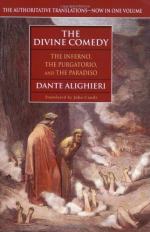And with thin ranks, after its banner mov’d
The army of Christ (which it so clearly cost
To reappoint), when its imperial Head,
Who reigneth ever, for the drooping host
Did make provision, thorough grace alone,
And not through its deserving. As thou heard’st,
Two champions to the succour of his spouse
He sent, who by their deeds and words might join
Again his scatter’d people. In that clime,
Where springs the pleasant west-wind to unfold
The fresh leaves, with which Europe sees herself
New-garmented; nor from those billows far,
Beyond whose chiding, after weary course,
The sun doth sometimes hide him, safe abides
The happy Callaroga, under guard
Of the great shield, wherein the lion lies
Subjected and supreme. And there was born
The loving million of the Christian faith,
The hollow’d wrestler, gentle to his own,
And to his enemies terrible. So replete
His soul with lively virtue, that when first
Created, even in the mother’s womb,
It prophesied. When, at the sacred font,
The spousals were complete ’twixt faith and him,
Where pledge of mutual safety was exchang’d,
The dame, who was his surety, in her sleep
Beheld the wondrous fruit, that was from him
And from his heirs to issue. And that such
He might be construed, as indeed he was,
She was inspir’d to name him of his owner,
Whose he was wholly, and so call’d him Dominic.
And I speak of him, as the labourer,
Whom Christ in his own garden chose to be
His help-mate. Messenger he seem’d, and friend
Fast-knit to Christ; and the first love he show’d,
Was after the first counsel that Christ gave.
Many a time his nurse, at entering found
That he had ris’n in silence, and was prostrate,
As who should say, “My errand was for this.”
O happy father! Felix rightly nam’d!
O favour’d mother! rightly nam’d Joanna!
If that do mean, as men interpret it.
Not for the world’s sake, for which now they pore
Upon Ostiense and Taddeo’s page,
But for the real manna, soon he grew
Mighty in learning, and did set himself
To go about the vineyard, that soon turns
To wan and wither’d, if not tended well:
And from the see (whose bounty to the just
And needy is gone by, not through its fault,
But his who fills it basely, he besought,
No dispensation for commuted wrong,
Nor the first vacant fortune, nor the tenth),
That to God’s paupers rightly appertain,
But, ’gainst an erring and degenerate world,
Licence to fight, in favour of that seed,
From which the twice twelve cions gird thee round.
Then, with sage doctrine and good will to help,
Forth on his great apostleship he far’d,
Like torrent bursting from a lofty vein;
And, dashing ’gainst the stocks of heresy,
Smote fiercest, where resistance was most stout.
Thence many rivulets have since been turn’d,
Over the garden Catholic to lead
Their living waters, and have fed its plants.
The army of Christ (which it so clearly cost
To reappoint), when its imperial Head,
Who reigneth ever, for the drooping host
Did make provision, thorough grace alone,
And not through its deserving. As thou heard’st,
Two champions to the succour of his spouse
He sent, who by their deeds and words might join
Again his scatter’d people. In that clime,
Where springs the pleasant west-wind to unfold
The fresh leaves, with which Europe sees herself
New-garmented; nor from those billows far,
Beyond whose chiding, after weary course,
The sun doth sometimes hide him, safe abides
The happy Callaroga, under guard
Of the great shield, wherein the lion lies
Subjected and supreme. And there was born
The loving million of the Christian faith,
The hollow’d wrestler, gentle to his own,
And to his enemies terrible. So replete
His soul with lively virtue, that when first
Created, even in the mother’s womb,
It prophesied. When, at the sacred font,
The spousals were complete ’twixt faith and him,
Where pledge of mutual safety was exchang’d,
The dame, who was his surety, in her sleep
Beheld the wondrous fruit, that was from him
And from his heirs to issue. And that such
He might be construed, as indeed he was,
She was inspir’d to name him of his owner,
Whose he was wholly, and so call’d him Dominic.
And I speak of him, as the labourer,
Whom Christ in his own garden chose to be
His help-mate. Messenger he seem’d, and friend
Fast-knit to Christ; and the first love he show’d,
Was after the first counsel that Christ gave.
Many a time his nurse, at entering found
That he had ris’n in silence, and was prostrate,
As who should say, “My errand was for this.”
O happy father! Felix rightly nam’d!
O favour’d mother! rightly nam’d Joanna!
If that do mean, as men interpret it.
Not for the world’s sake, for which now they pore
Upon Ostiense and Taddeo’s page,
But for the real manna, soon he grew
Mighty in learning, and did set himself
To go about the vineyard, that soon turns
To wan and wither’d, if not tended well:
And from the see (whose bounty to the just
And needy is gone by, not through its fault,
But his who fills it basely, he besought,
No dispensation for commuted wrong,
Nor the first vacant fortune, nor the tenth),
That to God’s paupers rightly appertain,
But, ’gainst an erring and degenerate world,
Licence to fight, in favour of that seed,
From which the twice twelve cions gird thee round.
Then, with sage doctrine and good will to help,
Forth on his great apostleship he far’d,
Like torrent bursting from a lofty vein;
And, dashing ’gainst the stocks of heresy,
Smote fiercest, where resistance was most stout.
Thence many rivulets have since been turn’d,
Over the garden Catholic to lead
Their living waters, and have fed its plants.




